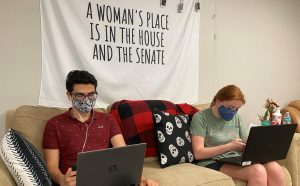#PoliticallyCorrect
Social media is a platform for students to partake in political discourse
October 25, 2020
When youthful exuberance, a wifi connection and a desire to change the country come together, it creates a passionate political climate. In the past, many students have been hesitant to align themselves with certain beliefs, but this election year transformed the political scene among teenagers. Teens are more enthusiastic than ever to pronounce their own positions, as well as sway undecided individuals.
Crucial to this process is social media. Amid the many targeted ads, students interact with their peers and connections, who often share their opinions.
Junior Julia Squitteri uses Instagram to encourage the people around her to volunteer with the Florida Democratic Party, as well as to share information about the politicians she backs, especially presidential candidate Joe Biden.

“I think it is important to advocate, but [also] to inform rather than to solely talk about one’s political opinion,” Squitteri said. “So many people vote for candidates who work against their interests due to the spread of misinformation, so it’s more important than ever to educate.”
Social media accounts are guilty of spreading such “fake news,” often completely by accident. In a study done by Statistica in 2019, 52% of people have shared false information online.
This statistic is one junior Reagan Eastlick understands the importance of.
“I try to educate myself on everything that I say before I say it. Everyone has a right to speak, but it would be better if people spoke about what they knew, and if they don’t know about it, if they learned,” Eastlick said.
Eastlick, however, knows the price of sharing this information online. The Pew Research Center reports as of 2017 four out of 10 Americans experience some form of online harassment, and Eastlick falls into that demographic. He has received countless threats since he began expressing his conservative views more openly. As a firm Republican Trump supporter, they do not seem to be going away.
“I would get terrible threats against myself and my family,” Eastlick said.
Junior Joshua Nemery is a staunch Biden supporter and knows this feeling well. Participating in online debates have

contributed to Nemery’s political experience.
“Whenever someone does disagree with me I try to hear them out,” Nemery said. “When things devolve into absurdity I start to ignore them.”
Nemery got into an argument over the right to abortion in his direct messages on Instagram.
“I felt kind of disappointed. I went through all that effort to explain to him my viewpoint, and he wouldn’t even consider it. He just said ‘no’ and nothing else,” Nemery said.
Nemery makes frequent political tweets covering all sorts of topics, one of the most prominent being his disdain for injustice in the current political system.
“For too long, lots of people have been… completely ignored by our government. These deep-seeded discrepancies trace back to the roots of how the system works,” Nemery said.
Junior Olivia Tulloch has also received pushback when defending her views on social inequality. When adding her own commentary to Instagram posts, Tulloch is not afraid to deal with the backlash.
“I mostly post things against racism, sexism and homophobia. If you want to flood my dm’s with threats… against those things, that says more about you than it does me.”
Of course, political activism is not for everyone, and the majority of students will not be able to vote for a president until the 2024 election. In the meantime, people will likely continue sharing their views online until the internet itself dies out.
“I just personally [share] because it’s a part of who I am and it’s something I’m interested in, but people don’t have to,” Tulloch said. “However, if you are silent on your morals, that’s a lack of character. Politics is one thing, basic human decency is another.”


